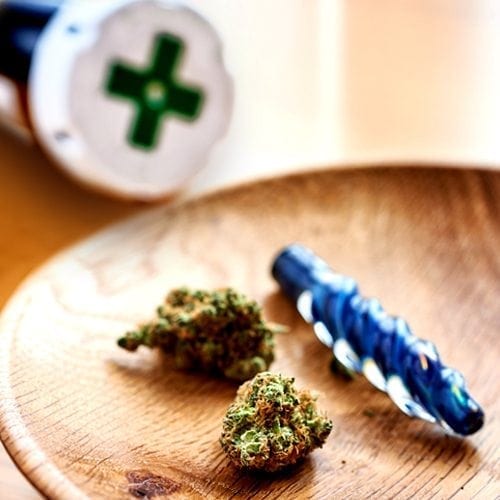
This past week in Cannabis has been full of back and forth legislation and small triumphs for the industry. Let’s look back at this past week’s news.
Nevada Assembly Speaker Guarantees “Pot Money” To Schools
Nevada Assembly Speaker, Jason Frierson introduced an education plan that will dedicate the 10% sales tax from Cannabis to Public Schools. At the moment, the funds have been allocated into a “rainy-day” fund. Frierson wants to boost the funds that go into this account. As well, he wants to setup a seperate “rainy-day” fund to combat any future recessions.
In addition to the accountability of the Cannabis funds, Frierson wishes to restore an incentive program for teachers in underperforming areas.
“As we head into Teacher Appreciation Week, I want to show each and every Nevada teacher that I am committed to putting words into action by proposing real policy changes that will translate into greater support in the classroom,” Frierson said.
Much of this was to combat the estimated $68 million deficit that the Clark Country School District may be heading toward next year; as well as teacher walkouts and protest nationwide from lack of funding.
No Gambling for Nevada Cannabis Users
Last week, the Nevada Gaming Commission amended its laws concerning “intoxicated gambling”. They seeked to clarify the rules on intoxication, changing the verbage to “visibly impaired”, referring to the new cannabis market and tourist looking to consume on casino property.
“It’s not smart to allow impaired people to gamble,” Chairman Tony Alamo told Las Vegas FOX-affilate KVVU. “Previously, we used the words ‘intoxication,’ and intoxication sometimes gives the feeling of just alcohol … We want to make it crystal-clear across the board under all regulations that ‘impairment’ is not just alcohol; it’s being impaired by drugs.”
The commission wants to make it clear that those consuming Cannabis and/or appearing to be high from it would not be permitted to gamble.
The clarification on the laws does raise a lot of questions about how it will be enforced and how it can be identified. It can result in abuse of power depending on how the employees are introduced to these changes and how they are implemented.
Will there be training on this? If so, how do you train someone to spot someone who is “too high”? Tolerance to THC is not the same for every user, making it the determination difficult.
The need to clarify the laws comes almost a year after the first sale date of recreational cannabis but, Chairman Alamo says it was not a factor in the decision, it comes with the change of times.
Maine fights LePage’s Veto
Late last month, Maine got some up and down news when Republican governor, Paul LePage, vetoed the legislative bill to pass recreational Cannabis. This wasn’t exactly surprising as LePage warned he would veto the bill citing “it wouldn’t combine Maine’s medical and adult-use marijuana programs.”
This past Wednesday, however, Legislation overturned the veto, House 109-39 and Senate 28-6.
The bill, originally drafted in 2016, would allow for the retail sale and production of the plant, giving citizens a place to purchase. Though it is unlikely that the state will see shops before 2019, the laws concerning those shops still need to be made.
In the new, more conservative, draft some things were changed as well. The bill will not allow “clubs” or lounges. Adults who purchase Cannabis will only be able to consume on private property, not in public. In addition, there has been no cap on the number of licenses or the amount of Cannabis allowed in the state of Maine. From the perspective of some, it could lead to problems that previously voted states, such as Oregon, are having. The demand and supply will outweigh at some point, forcing many shops to lower their prices and lose profits. In many cases, some have to sell their properties and businesses as bankruptcy in the still federally illegal industry isn’t possible.
Louisiana strives to add to MMJ program
It’ll be a slow and steady path for Louisiana legislation. Back in 1978, the state legalized Medical Marijuana for Glaucoma and Cancer. Since then, not many moves have been made towards a recreational market versus additions to their MMJ program. Though Marijuana has a long history with the state, policies and specifics of the bill make it difficult to excel like in other states. Specifics such as:
- Cannabis products can take the form of only pills, oils, sprays, and topicals such as transdermal patches.
- Qualifying conditions are limited to debilitating conditions that include HIV/AIDS, cancer, severe cerebral palsy, seizure disorders, epilepsy and muscular dystrophy.
- Patients can get only a month supply of MMJ at a time and must be re-examined by their physician at least every 90 days.
- Each physician can treat only 100 MMJ patients at a time; exceptions can be granted only by the state Board of Pharmacy.
- Only 15 physicians have registered for the program.
- Some doctors reportedly are gun shy because of social stigma or fear of prosecution given that MMJ remains illegal under federal law.
Last week, a legislative bill just passed the House adding chronic pain, post-traumatic stress disorder, and Parkinson’s disease to list qualifying conditions. As well, 9 medical pharmacies were approved to dispense MMJ products and 2 universities are working to produce medical cannabis.
“We’re glad things are speeding up,” David Boyer, a legislative analyst at the Marijuana Policy Project, said. “But, I think there’s definitely more reforms that need to be done before this is really a robust program.”
Iowa Opposes Expanding MMJ to Combat Opioid Abuse
Early last week, Iowa faced major opposition in expanding its MMJ program. Senate considered an amendment to a bill combating opioid addiction. Due to Cannabis language however, Republicans killed the bill which addressed such opioid abuse. The decision pushes legislation to 2019 when the state will hear recommendations from an advisory board.
Republican House Speaker, Linda Upmeyer made it clear that she isn’t ready to make a decision until then.
The Senate proposal would have continued to limit the types of marijuana products that could be sold in Iowa, much like Louisiana. Marijuana in leaf form would not be available for medical purposes. Iowa’s sole authorized producer plans to make creams, oils and capsules.
The Senate voted 45-5 last year for a broad medical marijuana bill, which would have allowed the medication to be used for many conditions. But on the last day of the 2017 session, the Senate agreed to a stricter House bill, which limited the kinds of products that may be sold and the categories of patients who may buy them.
CA Receives $4.7 Million for Research
Following recommendations for CBD use for severe autism, the University of California (San Diego) has been funded for such research. According to Ganjapreneur, the University has received a grant of $4.7 million to study Autism Spectrum Disorders. They will go into a deeper study of how effective CBD really is as well as how medical cannabinoids can alleviate symptoms in children with severe cases of autism.
To date, this would be the largest sum of money gifted for the research of Medical Marijuana in the US. With more legislators and politicians coming forward in support of Cannabis, this research will no doubt play a part in its federal legalization.
Last year, GW Pharmaceuticals was authorized by FDA to do similar trials. The US Food and Drug Association doesn’t combat that Cannabis and CBD help children dealing with life-threatening seizures. If they are going to give it the stamp of approval, however, they want safe testing to be presented with the claims.
Written by: Joycelin A.





